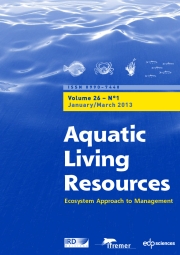Crossref Citations
This article has been cited by the following publications. This list is generated based on data provided by
Crossref.
Suquet, M.
Dreanno, C.
Fauvel, C.
Cosson, J.
and
Billard, R.
2000.
Cryopreservation of sperm in marine fish.
Aquaculture Research,
Vol. 31,
Issue. 3,
p.
231.
Labbe, Catherine
Martoriati, Alain
Devaux, Alain
and
Maisse, Gerard
2001.
Effect of sperm cryopreservation on sperm DNA stability and progeny development in rainbow trout.
Molecular Reproduction and Development,
Vol. 60,
Issue. 3,
p.
397.
Chereguini, O
De La Banda, I G
Rasines, I
and
Fernandez, A
2001.
Larval growth of turbot, Scophthalmus maximus
(L.) produced with fresh and cryopreserved sperm.
Aquaculture Research,
Vol. 32,
Issue. 2,
p.
133.
Babiak, I.
Glogowski, J.
Dobosz, S.
Kuzminki, H.
and
Goryczko, K.
2002.
Semen from rainbow trout produced using cryopreserved spermatozoa is more suitable for cryopreservation.
Journal of Fish Biology,
Vol. 60,
Issue. 3,
p.
561.
Chereguini, O
De La Banda, I García
Rasines, I
and
Fernández, A
2002.
Growth and survival of young turbot (Scophthalmus maximus
L.) produced with cryopreserved sperm.
Aquaculture Research,
Vol. 33,
Issue. 8,
p.
637.
Zilli, L.
Schiavone, R.
Zonno, V.
Storelli, C.
and
Vilella, S.
2003.
Evaluation of DNA damage in Dicentrarchus labrax sperm following cryopreservation.
Cryobiology,
Vol. 47,
Issue. 3,
p.
227.
Rideout, R M
Litvak, M K
and
Trippel, E A
2003.
The development of a sperm cryopreservation protocol for winter flounder Pseudopleuronectes americanus
(Walbaum): evaluation of cryoprotectants and diluents.
Aquaculture Research,
Vol. 34,
Issue. 8,
p.
653.
Chereguini, O
García de la Banda, I
Herrera, M
Martinez, C
and
De la Hera, M
2003.
Cryopreservation of turbot Scophthalmus maximus
(L.) sperm: fertilization and hatching rates.
Aquaculture Research,
Vol. 34,
Issue. 9,
p.
739.
Pavlov, D.
Kjørsvik, E.
Refsti, T.
and
Andersen, Ø.
2004.
Culture of Cold‐Water Marine Fish.
p.
129.
Rideout, R. M.
Trippel, E. A.
and
Litvak, M. K.
2004.
The development of haddock and Atlantic cod sperm cryopreservation techniques and the effect of sperm age on cryopreservation success.
Journal of Fish Biology,
Vol. 65,
Issue. 2,
p.
299.
Zilli, Loredana
Schiavone, Roberta
Zonno, Vincenzo
Rossano, Rocco
Storelli, Carlo
and
Vilella, Sebastiano
2005.
Effect of Cryopreservation on Sea Bass Sperm Proteins.
Biology of Reproduction,
Vol. 72,
Issue. 5,
p.
1262.
Cabrita, E.
Robles, V.
Rebordinos, L.
Sarasquete, C.
and
Herráez, M.P.
2005.
Evaluation of DNA damage in rainbow trout (Oncorhynchus mykiss) and gilthead sea bream (Sparus aurata) cryopreserved sperm.
Cryobiology,
Vol. 50,
Issue. 2,
p.
144.
Liu, Qinghua
Li, Jun
Zhang, Shicui
Ding, Fuhong
Xu, Xizhang
Xiao, Zhizhong
and
Xu, Shihong
2006.
An Efficient Methodology for Cryopreservation of Spermatozoa of Red Seabream, Pagrus major, with 2‐mL Cryovials.
Journal of the World Aquaculture Society,
Vol. 37,
Issue. 3,
p.
289.
Liu, Qing Hua
Li, Jun
Xiao, Zhi Zhong
Ding, Fu Hong
Yu, Dao De
and
Xu, Xi Zhang
2007.
Use of computer-assisted sperm analysis (CASA) to evaluate the quality of cryopreserved sperm in red seabream (Pagrus major).
Aquaculture,
Vol. 263,
Issue. 1-4,
p.
20.
Liu, Q.H.
Li, J.
Zhang, S.C.
Xiao, Z.Z.
Ding, F.H.
Yu, D.D.
and
Xu, X.Z.
2007.
Flow cytometry and ultrastructure of cryopreserved red seabream (Pagrus major) sperm.
Theriogenology,
Vol. 67,
Issue. 6,
p.
1168.
Lanes, Carlos Frederico Ceccon
Okamoto, Marcelo
Cavalcanti, Paulo Varoni
Collares, Tiago
Campos, Vinicius Farias
Deschamps, João Carlos
Robaldo, Ricardo Berteaux
Marins, Luis Fernando
and
Sampaio, Luís André
2008.
Cryopreservation of Brazilian flounder (Paralichthys orbignyanus) sperm.
Aquaculture,
Vol. 275,
Issue. 1-4,
p.
361.
Zilli, L.
Schiavone, R.
Storelli, C.
and
Vilella, S.
2008.
Effect of cryopreservation on phosphorylation state of proteins involved in sperm motility initiation in sea bream.
Cryobiology,
Vol. 57,
Issue. 2,
p.
150.
Cosson, J.
Groison, A.-L.
Suquet, M.
Fauvel, C.
Dreanno, C.
and
Billard, R.
2008.
Studying sperm motility in marine fish: an overview on the state of the art.
Journal of Applied Ichthyology,
Vol. 24,
Issue. 4,
p.
460.
Li, Ping
Hulak, Martin
and
Linhart, Otomar
2009.
Sperm proteins in teleostean and chondrostean (sturgeon) fishes.
Fish Physiology and Biochemistry,
Vol. 35,
Issue. 4,
p.
567.
Gwo, J
Jamieson, B
and
Leung, L
2009.
Reproductive Biology and Phylogeny of Fishes, Vol 8B.
p.
395.


